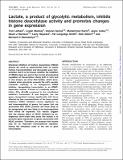Lactate, a product of glycolytic metabolism, inhibits histone deacetylase activity and promotes changes in gene expression
Abstract
Chemical inhibitors of histone deacetylase (HDAC) activity are used as experimental tools to induce histone hyperacetylation and deregulate gene transcription, but it is not known whether the inhibition of HDACs plays any part in the normal physiological regulation of transcription. Using both in vitro and in vivo assays, we show that lactate, which accumulates when glycolysis exceeds the cell's aerobic metabolic capacity, is an endogenous HDAC inhibitor, deregulating transcription in an HDAC-dependent manner. Lactate is a relatively weak inhibitor (IC50 40 mM) compared to the established inhibitors trichostatin A and butyrate, but the genes deregulated overlap significantly with those affected by low concentrations of the more potent inhibitors. HDAC inhibition causes significant up and downregulation of genes, but genes that are associated with HDAC proteins are more likely to be upregulated and less likely to be downregulated than would be expected. Our results suggest that the primary effect of HDAC inhibition by endogenous short-chain fatty acids like lactate is to promote gene expression at genes associated with HDAC proteins. Therefore, we propose that lactate may be an important transcriptional regulator, linking the metabolic state of the cell to gene transcription.
Citation
Latham , T , Mackay , L , Sproul , D , Karim , M , Culley , J , Harrison , D J , Hayward , L , Langridge-Smith , P , Gilbert , N & Ramsahoye , B H 2012 , ' Lactate, a product of glycolytic metabolism, inhibits histone deacetylase activity and promotes changes in gene expression ' , Nucleic Acids Research , vol. 40 , no. 11 , pp. 4794-4803 . https://doi.org/10.1093/nar/gks066
Publication
Nucleic Acids Research
Status
Peer reviewed
ISSN
0305-1048Type
Journal article
Collections
Items in the St Andrews Research Repository are protected by copyright, with all rights reserved, unless otherwise indicated.

